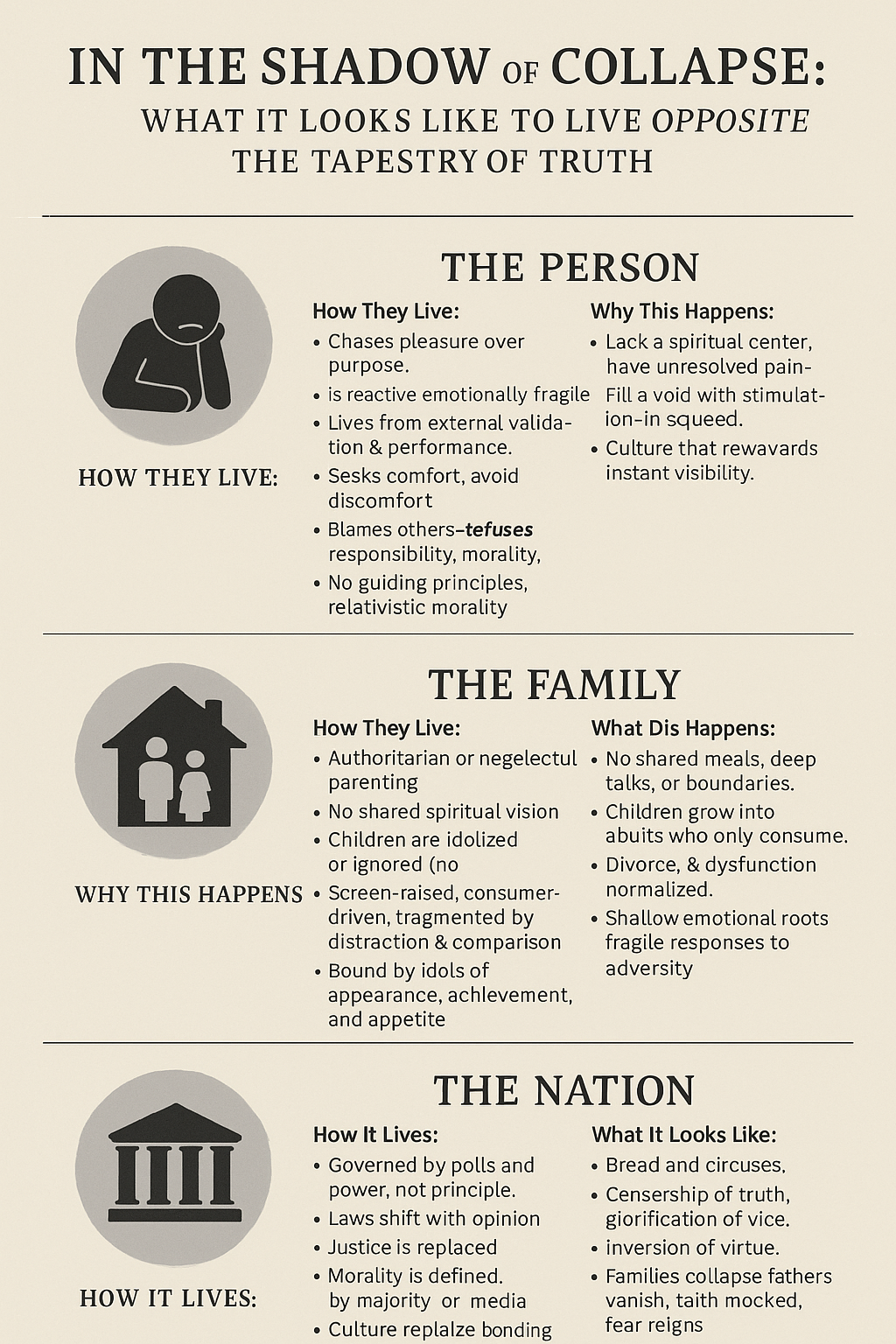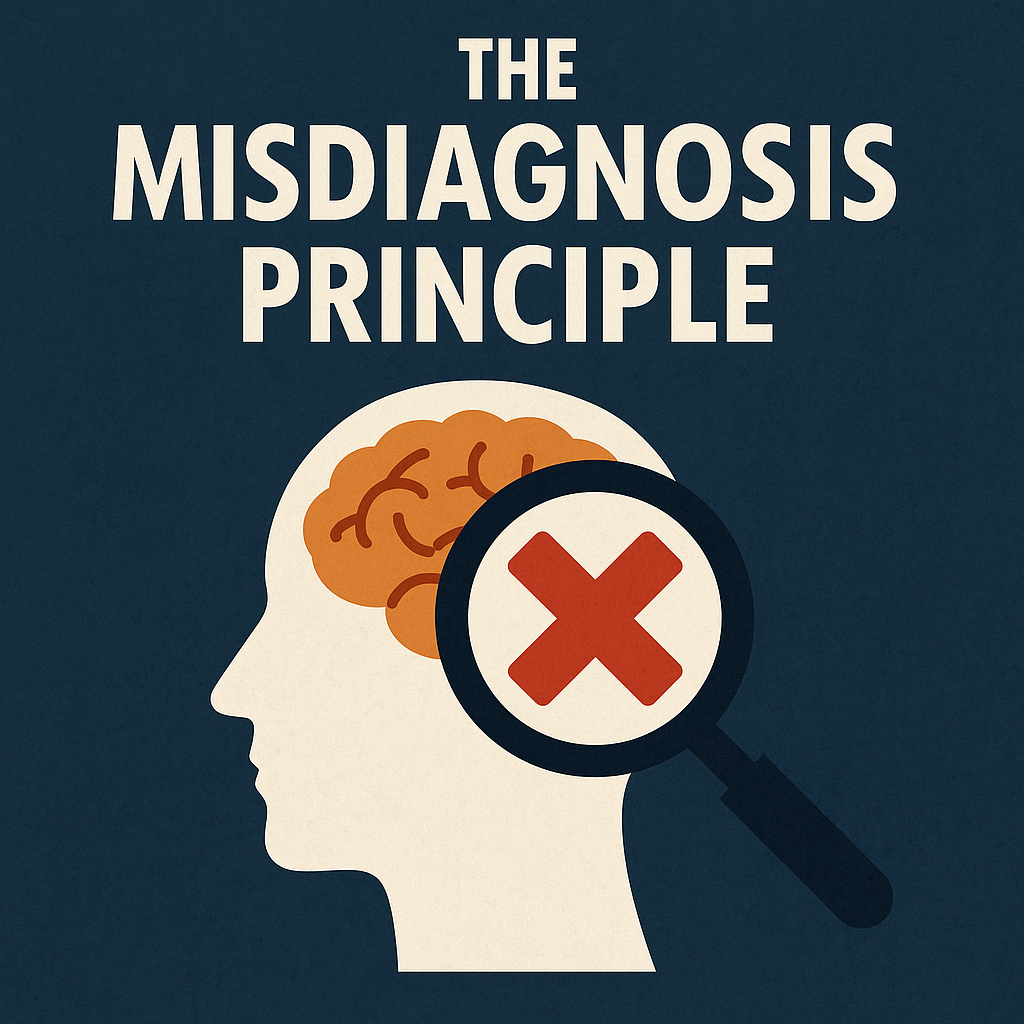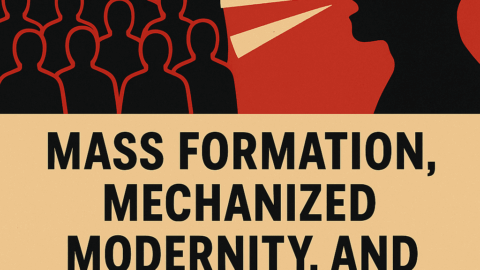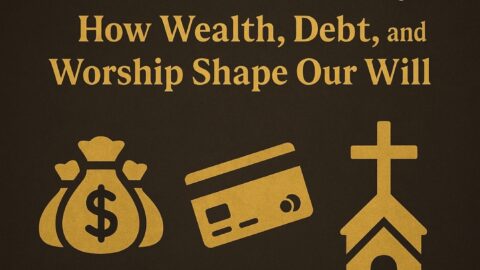A Portrait of the Person, Family, and Nation in Decline
“By their fruits ye shall know them.” — Matthew 7:16
A tapestry, by design, is composed of thousands of intentional threads — woven in harmony to form a beautiful and meaningful whole. A tapestry is one of moral strength, emotional intelligence, principled living, sacred identity, generational wisdom, and divine-centered purpose.
But what happens when we live opposite of this tapestry? When the threads unravel, or are never woven at all?
This is a portrait of that decay — the counterfeit of character, the idol in place of identity, the collapse hidden beneath comfort.
THE PERSON WITHOUT THE TAPESTRY
How they live:
- Chases pleasure over purpose (Dopamine Nation)
- Is reactive, impulsive, and emotionally fragile (feeds the bad wolf)
- Lives from external validation, image, and performance (personality ethic over character)
- Seeks comfort, avoids discomfort (Fixed Mindset)
- Is in the box, blaming others and refusing responsibility (Arbinger)
- Has no guiding principles; morality is relativistic and situational (Abolition of Man)
Why this happens:
- Without spiritual center or eternal compass, identity becomes shaped by appetite, peer influence, and algorithm.
- Trauma, fatherlessness, and unresolved pain block growth (emotional and moral)
- Without purpose, the void is filled by stimulation — sex, entertainment, gambling, social media, substances.
- Culture rewards instant visibility, not inner virtue
What it looks like:
- Passive or performative — cannot endure solitude, silence, or sacrifice.
- Avoids hard decisions; relies on trends, popularity, or addiction to escape inner emptiness.
- Cannot sustain relationships — either needy or narcissistic.
- Spiritually blind and morally compromised, yet feels righteous in their own eyes.
“He who serves two masters will love one and despise the other.” (Matthew 6:24)
THE FAMILY WITHOUT THE TAPESTRY
How they live:
- Emotionally reactive parenting — authoritarian or neglectful extremes
- No shared spiritual vision; disconnected from higher purpose
- Children are either idolized or ignored; not matured (Jenkins’ stages: stuck in Stage 1 control)
- Screen-raised, consumer-driven, fragmented by distraction and comparison
- Bound by idols of appearance, achievement, and appetite (Gileadi)
Why this happens:
- Parents were never taught principle-centered parenting; repeat cycles of trauma or permissiveness.
- The family worships comfort, appearances, or material success (worldly path).
- The home is not a center of spiritual formation but a base for logistics and entertainment.
- Busyness replaces bonding; achievement replaces meaning.
What it looks like:
- No shared meals, deep conversations, or hard-won boundaries.
- Children grow into adults who don’t know who they are — only what they consume.
- Divorce, disconnection, and dysfunction become normalized.
- Shallow emotional roots = fragile responses to adversity.
“If the foundations be destroyed, what can the righteous do?” (Psalm 11:3)
THE NATION WITHOUT THE TAPESTRY
How it lives:
- Governed by polls, pleasure, and power — not principle
- Laws shift with opinion; justice is replaced with manipulation
- Morality is defined by the majority or media (Stage 4 blind conformity or worse)
- Comfort is more sacred than conscience; safety more valuable than liberty
- Schools indoctrinate rather than educate; virtue is replaced with vice
Why this happens:
- The citizenry lacks virtue (Tytler): selfish, complacent, apathetic, dependent.
- Truth is politicized; power is consolidated.
- Idols of economy, entertainment, and ego dominate every institution.
- Leaders reflect the vices of the people — not their aspirations toward greatness.
What it looks like:
- Bread and circuses: sports, celebrities, gambling, consumerism.
- Censorship of truth, glorification of vice, inversion of virtue.
- Families collapse, fathers vanish, faith is mocked, and fear reigns.
- The “devil is in every pocket” — but we no longer notice.
“Woe unto them that call evil good, and good evil…” (Isaiah 5:20)
The Opposite of the Tapestry — In Summary
| Element | Opposite of the Tapestry |
|---|---|
| Principle-centered | Appetite-centered, impulsive, relativistic |
| Divine identity | Identity through media, sexuality, fame |
| Out-of-the-box living | Blame, victimhood, moral cowardice |
| Tytler’s Liberty Chain | Apathy, dependence, bondage |
| Growth/Faith Mindset | Fixed, helpless, self-pitying |
| Parenting model | Control, neglect, permissiveness (no maturity) |
| Assets vs Liabilities | Consumes liabilities, idolizes fame, ignores spiritual wealth |
| Abolition of Man | Rejects objective moral law — embraces moral confusion |
| Hero’s Journey | Replaced by consumption loop; no call to purpose |
| Stoicism/Discipline | Emotionally fragile, addicted to ease and escape |
| Emotional Intelligence | Reactivity, entitlement, suppression |
| Kindness & Justice | Selfishness, manipulation, cruelty masked as “tolerance” |
| Frankl’s Meaning | Will to pleasure/power replaces the will to meaning |
Final Word: The Way Back
To live opposite of the tapestry is to live in bondage — spiritual, moral, emotional, and national.
But even now, the invitation is open:
- Rebuild the inner man before demanding outer change.
- Rebuild the home before rescuing the nation.
- Restore the sacred, reject the idol.
“Stand at the crossroads and look; ask for the ancient paths, ask where the good way is, and walk in it, and you will find rest for your souls.” — Jeremiah 6:16.






